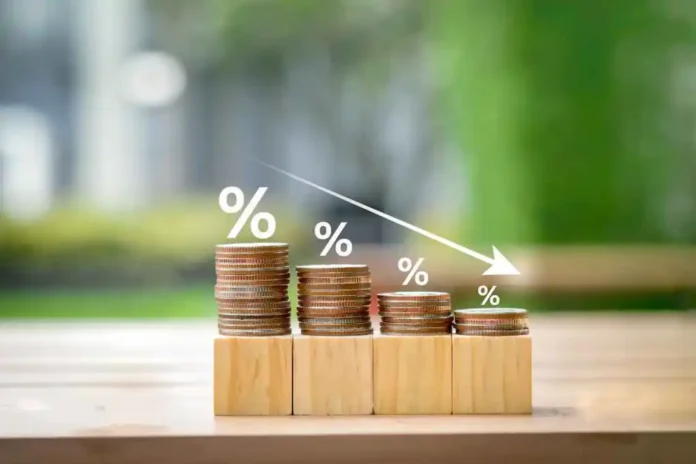As of May 1, 2025, mortgage rates move lower, offering a glimmer of hope for homebuyers navigating a turbulent housing market. According to Freddie Mac, the 30-year fixed mortgage rate dropped to 6.76% this week, down from 6.83% just days ago, marking a subtle but notable shift. This dip follows a volatile April, where rates spiked to a two-month high of 6.90% amid economic uncertainty and President Trump’s tariff policies. While this decline sparks cautious optimism, many wonder if it’s enough to thaw a housing market frozen by high rates, soaring home prices, and buyer hesitation. Let’s dive into the latest trends, expert insights, and what this means for aspiring homeowners.
The housing market has been in a slump, with existing home sales in March 2025 posting their biggest monthly drop since 2022, per NPR. Despite increased inventory—up nearly 20% from last year—sales fell 5.9%, as high rates and economic jitters sidelined buyers. However, new home sales rose 7.4% in March, hinting at pockets of resilience. With rates now easing, could this be the turning point? Here’s a closer look at the forces shaping the market and whether lower rates can spark a revival.
Why Mortgage Rates Move Lower: What’s Driving the Drop?
Several factors are nudging mortgage rates downward. The Federal Reserve’s decision to hold its benchmark rate steady in April 2025, coupled with cooling consumer spending, has eased pressure on Treasury yields, which often influence mortgage rates. Experts like Steven Glick, a mortgage loan officer at HomeAbroad, predict rates could settle between 6.4% and 6.6% in May, a range that’s still high but more palatable than the 7.14% peak in April, per Investopedia. Posts on X echo this sentiment, with users noting bond market stability as a key driver.
Yet, the decline isn’t guaranteed to last. The Fed’s next meeting on May 6-7 could shift expectations, especially if inflation data or Trump’s trade policies reignite volatility. For now, the bond market’s calm has given lenders room to lower rates, but economic uncertainty looms large. Homebuyers are left wondering: is this a window of opportunity or a fleeting tease?
| Key Mortgage Rate Trends (April-May 2025) |
|---|
| 30-Year Fixed Rate: 6.76% (Freddie Mac, May 1) |
| FHA Rate: 6.35% (X post, April 25) |
| VA Rate: 6.37% (X post, April 25) |
| Refinance Rate: Dropped 30 basis points this week (Yahoo Finance, April 30) |
Can Lower Rates Revive the Housing Market?
While mortgage rates move lower, the housing market faces deeper challenges. Home prices remain sky-high, with the median existing home price hitting $403,700 in March 2025, up 2.7% from last year, per Axios. Inventory, though improved, is still at a lean four-month supply, far from the balanced six-month mark. Buyers are also grappling with broader fears—job security, stock market dips, and potential tariff-driven price hikes on home furnishings, as noted by NAR economist Lawrence Yun.
Refinance activity offers a silver lining. Applications are up 43% year-over-year, despite a 20% weekly drop, per CNBC. Homeowners with rates below 4%—about 800,000 of whom face expiring fixed-rate deals annually until 2027—are seizing the chance to lock in lower payments. But for first-time buyers, affordability remains a hurdle. FHA loans, with rates around 6.35%, are gaining traction among this group, showing resilience despite the sluggish market.
What Experts and Buyers Are Saying
Industry voices paint a mixed picture. Bankrate’s Jeff Ostrowski notes that a slowing economy and post-election uncertainty could keep rates on a downward path, with Fannie Mae forecasting 6.2% by year-end. Conversely, the Mortgage Bankers Association expects rates to hover at 6.7%, citing inflation and tariff risks. On X, users like @theagenttrades highlight buyer hesitancy, with mortgage demand dropping 4% last week despite lower rates.
Buyers, meanwhile, are stuck in a waiting game. “Sellers are listing at prices buyers can’t touch,” says one realtor quoted by Axios. The disconnect is stark: high rates and prices clash with buyer budgets, freezing mobility. Yet, some experts urge action. “Trying to time the market rarely works,” says Clyde from Yahoo Finance, advising buyers to focus on their finances rather than chasing lower rates.
Mortgage Rates Move Lower: Should You Act Now?
For those eyeing a home purchase, the current dip in rates presents a strategic moment. Locking in a rate around 6.76% could save thousands over a loan’s life compared to April’s highs. Refinancing also makes sense for those with rates above 7%, especially if credit scores have improved. However, risks remain. A weakening labor market or tariff-driven inflation could push rates back up, as warned by Mortgage News Daily’s Matthew Graham.
Here are some actionable steps for buyers:
- Shop around: Compare lenders, as rates vary. Sub-4% deals are reappearing in some markets, per BBC.
- Consider loan types: FHA or VA loans offer lower rates for eligible buyers.
- Lock in rates: Protect against volatility by securing a rate now, with the option to switch if rates drop further.
- Budget wisely: Factor in rising home prices and potential tariff-related costs.
Looking Ahead: A Cautious Optimism
As mortgage rates move lower, the housing market stands at a crossroads. The slight decline offers breathing room, but it’s not a cure-all for affordability woes or buyer anxiety. With inventory slowly growing and new construction showing promise, there’s potential for a spring rebound—if rates hold steady. Yet, the Fed’s next moves and global trade tensions could upend this fragile balance.
For now, savvy buyers and homeowners are seizing the moment, whether by locking in a mortgage or refinancing to ease monthly burdens. The market’s pulse is faint but beating, and those who act decisively may find opportunities amid the uncertainty. Stay tuned for May’s economic data, particularly the Fed’s meeting and jobs report, which could dictate the housing market’s next chapter. Will lower rates finally unlock the market, or is this just a brief respite? Only time will tell, but the stakes for buyers have never been higher.
